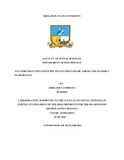Please use this identifier to cite or link to this item:
https://cris.library.msu.ac.zw//handle/11408/3476Full metadata record
| DC Field | Value | Language |
|---|---|---|
| dc.contributor.author | Vandirayi, Shelter | - |
| dc.date.accessioned | 2019-03-18T10:33:19Z | - |
| dc.date.available | 2019-03-18T10:33:19Z | - |
| dc.date.issued | 2018 | - |
| dc.identifier.uri | http://hdl.handle.net/11408/3476 | - |
| dc.description.abstract | When it comes to HIV/AIDS prevention and treatment, there is a growing population that is being overlooked due to a prolonging misconception about HIV/AIDS being a disease of the young adults. The introduction of the highly active antiretroviral therapy has allowed the survival of the elderly after diagnosis. Because of the perception that HIV is a disease of the young adults, HIV disclosure of positive serostatus has become an area of concern among the elderly. It is therefore the aim of this study to focus on the factors that influence disclosure among the elderly. A qualitative study with the application of phenomenological approach was carried out to find out factors that influence disclosure among the elderly. Sample data was obtained from 14 participants aged 50 years and above who attended Shurugwi District Hospital for ART. Using the convenience sampling technique, the researcher was able to select those patients who were easily accessible until sample size was reached. The main findings from the research indicated that fear of stigma was the main reason that hindered the elderly to freely disclose their HIV positive serostatus. Stigma was found to cut across all the interactions in the social lives of these elderly people living with HIV in Shurugwi. Due to fear of stigma, findings from the research highlighted that the elderly used various strategies to cope with a positive HIV serostatus in a stigmatized environment. The researcher used interpretive thematic analysis that allowed coding of findings. Stigma was found to play a major role in hindering disclosure of a positive HIV status among the elderly people in Shurugwi. In order to reduce the negative consequences of disclosure, the general population should be educated about the importance of disclosure so that perceived consequences of disclosure like stigma can be reduced and prevented. | en_US |
| dc.language.iso | en | en_US |
| dc.publisher | Midlands State University | en_US |
| dc.subject | Anti-retro-viral therapy | en_US |
| dc.subject | HIV/AIDS | en_US |
| dc.subject | Treatment | en_US |
| dc.subject | Prevention | en_US |
| dc.title | Factors that influence HIV status disclosure among the elderly in Shurugwi | en_US |
| item.languageiso639-1 | en | - |
| item.fulltext | With Fulltext | - |
| item.grantfulltext | open | - |
| Appears in Collections: | Bsc Psychology Honours Degree | |
Files in This Item:
| File | Description | Size | Format | |
|---|---|---|---|---|
| sheltah vandirayi-DISSERTATION 2018.pdf | Full Text | 1.14 MB | Adobe PDF |  View/Open |
Page view(s)
290
checked on Feb 14, 2026
Download(s)
124
checked on Feb 14, 2026
Google ScholarTM
Check
Items in MSUIR are protected by copyright, with all rights reserved, unless otherwise indicated.



